Donald Trump, Ted Cruz, Jeb Bush, Chris Christie and Rand Paul (L-R) participate in the fifth Republican presidential candidates' debate at the Venetian Hotel & Casino in Las Vegas, Nevada on December 15, 2015. The top 9 candidates squared off in the first-tiered debate on the main stage. Pool Photo by Ruth Fremson/UPI |
License Photo
Had last Tuesday's Republican presidential debate taken place in a school room where fact, objectivity and real understanding of national security were grading criteria instead of a school yard where bullying and bragging dominate, none of the debaters would have passed. For those who understand national security, following this debate was painful.
How aspirants for the nation's highest office can be so ill-informed on basic issues is a non-trivial question. For example, how can anyone advocate "carpet bombing" and killing family members of Islamic State members without understanding the meaning or implications of what is being proposed? How could each of the candidates implicitly argue for the absolute necessity of "destroying" IS without asking why our allies in the region clearly regard the terror group as less of a threat than we do? And how can anyone argue for banning all Muslims from entry into America on a temporary basis -- even with exceptions -- and without understanding the Constitution and basic U.S. law despite FDR's incarceration of Japanese-Americans during World War II?
The reasons for these and other overly simplistic -- or as one candidate likes to say -- entirely "stupid" positions cannot rest in the absence of intellect and experience among the various candidates. Five are or were U.S. Senators; five are or were governors; three were successful in private life; and each should not be lacking for competent advisers. Yet, none seems to display the requisite knowledge, ability and judgment regarding national security to serve as president. Why?
First, to win nomination and election, he or she whose promises resonate with the electorate stands the best chance of becoming president. Too often, those promises are based on political expediency and invariably prove false. John Kennedy ran to the right of Richard Nixon in 1960 by declaring a huge "missile gap" existed between the U.S. and U.S.S.R. JFK was correct -- except the gap was in our favor. Asked why Kennedy then went on a huge military buildup based a non-existent missile gap when the government had irrefutable intelligence to the contrary, his most senior advisers later cynically said that the president had to make good on his campaign promise.
Richard Nixon promised a "secret plan" to end the Vietnam War. That plan was so secret that neither Nixon nor his National Security Advisor Henry Kissinger knew what it was because it did not exist. Barack Obama campaigned to end the wars in Iraq and Afghanistan. Certainly in the latter, as president, he precipitously withdrew forces despite his military's strong objections -- which proved correct. In Iraq, Obama's hands were tied because George W. Bush could not secure agreement to maintain certain U.S. troops levels due to an intransigent government in Baghdad. Indeed, when Senators John McCain and Lindsey Graham later complained that Iraqi Prime Minister Nouri al Maliki assured them his government would have approved a stay behind force, Maliki was duplicitous and obsequious to garner more American aid, much of which allegedly went into the pockets of members of his government.
Second, Americans are angered, worried and concerned about their future security -- economic and physical. Despite fewer than fifty Americans having been killed at home by Islamist terrorists, all but one a citizen -- and the chances of being shot or killed by a police officer orders of magnitude greater -- fear is a motivator. Each candidate is playing the fear card.
Third, candidates are busy people. Few have time to be brought up to speed on issues with which they lack familiarity. In some cases, inexperienced staffers are providing point papers. In others, retreads from earlier administrations who erred badly are giving advice. But, for whatever reason, the result is what was on display last Tuesday. And that was not good.
Can anything be done? Probably not. The media could ask more probing questions. Unfortunately, a stage full of nine candidates is not conducive to in depth inquisitions. Candidates could be asked to provide specific answers in writing with the stipulation that each affirms that this was their sole work not done by staff or consultants. And individuals who were part of reckless and wrong decisions in prior administrations banned from giving advice.
Clearly, one can argue that these suggestions are as unrealistic as what the candidates are proposing. What would work is a well-informed American public -- the best antidote to the candidates' ill-conceived and often dangerous ideas. But how can or will Americans become better informed? That question is tragically unanswerable.
____________________________________________________________________
Harlan Ullman is UPI's Arnaud de Borchgrave Distinguished Columnist; Chairman of the Killowen Group that advises leaders of government and business and Senior Advisor at Washington DC's Atlantic Council and Business Executives for National Security (BENS). His latest book is A Handful of Bullets: How the Murder of Archduke Franz Ferdinand Still Menaces the Peace.















